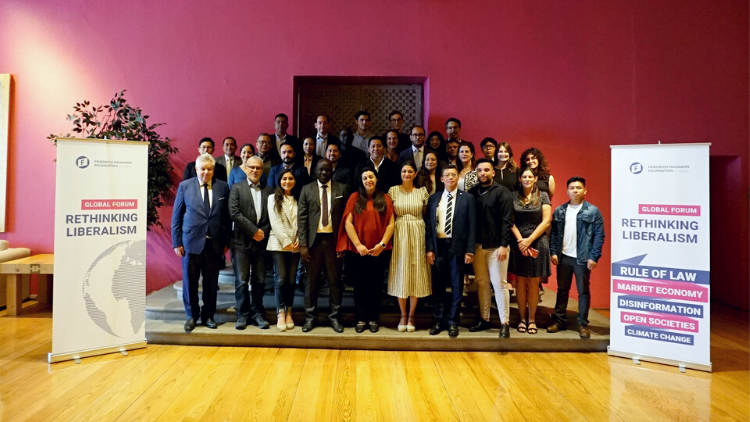Liberalism
Shared ownership of Liberalism

Under uncertainty, populism tends to thrive. And let's face it, with climate change, migration, and technology constantly changing our lives, there's plenty to fear these days. Social media plays a big role too, easily triggering our own biases and flooding us with intolerance, fake news, and shutting down real debates. Populism is on the rise worldwide, from Western Europe to Asia, Latin America, and even the United States. So, where does liberalism fit into all of this?
As MdB Michael Link explained, “the goals are very clear, but we need to review and refine how we get there.” That's why we organized our first-ever global forum of the Naumann Foundation: Rethinking Liberalism, which brought together Naumann offices from Latin America, Africa, the MENA Region, and Europe. Around different countries, liberalism faces common challenges. In this sense, sharing ideas, best practices, and different viewpoints on how to address populism, and the threats to democracies and free societies can bring collaborative strategies.
The rise of populism and the presence of unregulated artificial intelligence (AI) pose threats to various aspects of liberalism, including free elections and the rapid spread of fake news. To tackle populism, we must confront it with liberalism, employing new strategies to reestablish liberalism's position in the hearts and minds of the people. By reminding individuals of the true nature and consequences of populism in various contexts, we can effectively counter it.
The goals are very clear, but we need to review and refine how we get there.

All around the world, we are struggling to find the right balance between fundamental freedoms, particularly in cases where conflicts arise. One prominent clash is between freedom of speech, misinformation, and hate speech. Where should the line be drawn? Can an absolute limit be established?
While we understand that hate speech does not fall under the realm of freedom of speech, in practice, defining the boundaries can be challenging as they tend to be subjective. Moreover, the spread of misinformation has been proven difficult to stop. But what if we approached the problem of disinformation as if it were a virus?
In this metaphorical sense, it could be argued that we could develop a vaccine against it. Continuing with this analogy, what would the "vaccine" against disinformation look like in 2023? Education and literacy emerge as one of the answers. However, it's impossible for individuals to possess knowledge about every existing subject. Perhaps the right approach is to make people aware of the characteristics of disinformation. Just as a vaccine introduces small doses of a virus to strengthen the immune system, we could exercise our minds with exposure to examples of disinformation. This would equip people with the necessary tools to identify potential instances of disinformation.
In recent times, we have witnessed a trend in some countries where economic growth is overshadowing the principles of democracy. China serves as an example, as it discards the "inconveniences" associated with democratic systems in favor of fostering dynamic economies. However, this economic progress comes at the expense of personal liberties, a notion exemplified by the stringent lockdown measures implemented during the Covid pandemic.
This raises the question: what lies ahead for liberalism in the present era?
It appears that liberalism is drawing inspiration from individuals across various regions, resulting in a more diverse and inclusive movement. Despite changing circumstances, the core values of liberalism are expected to endure. True freedom necessitates the presence of the rule of law, which, in turn, requires limitations on the powers of the government. Moreover, innovation thrives through the exchange of ideas and products. While the methods and approaches may evolve, the fundamental principles of liberalism remain unwavering.
